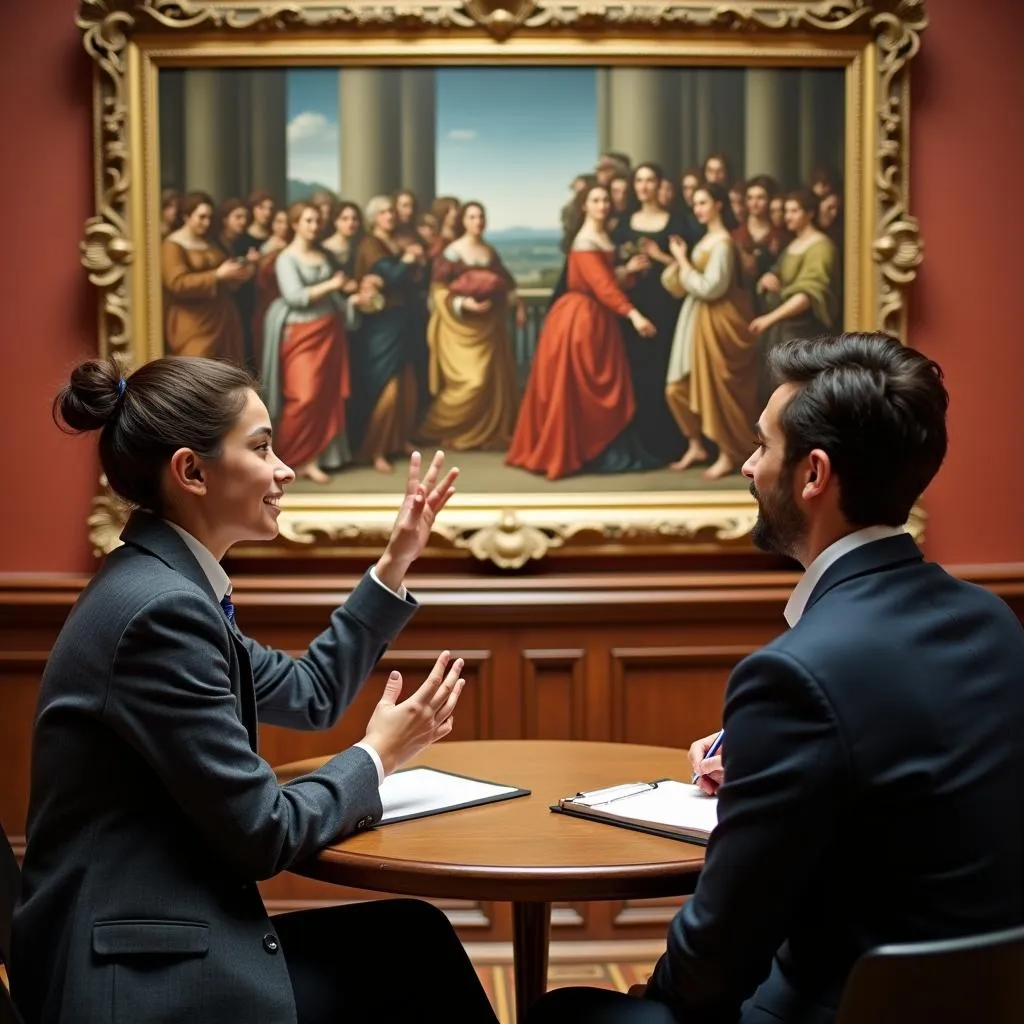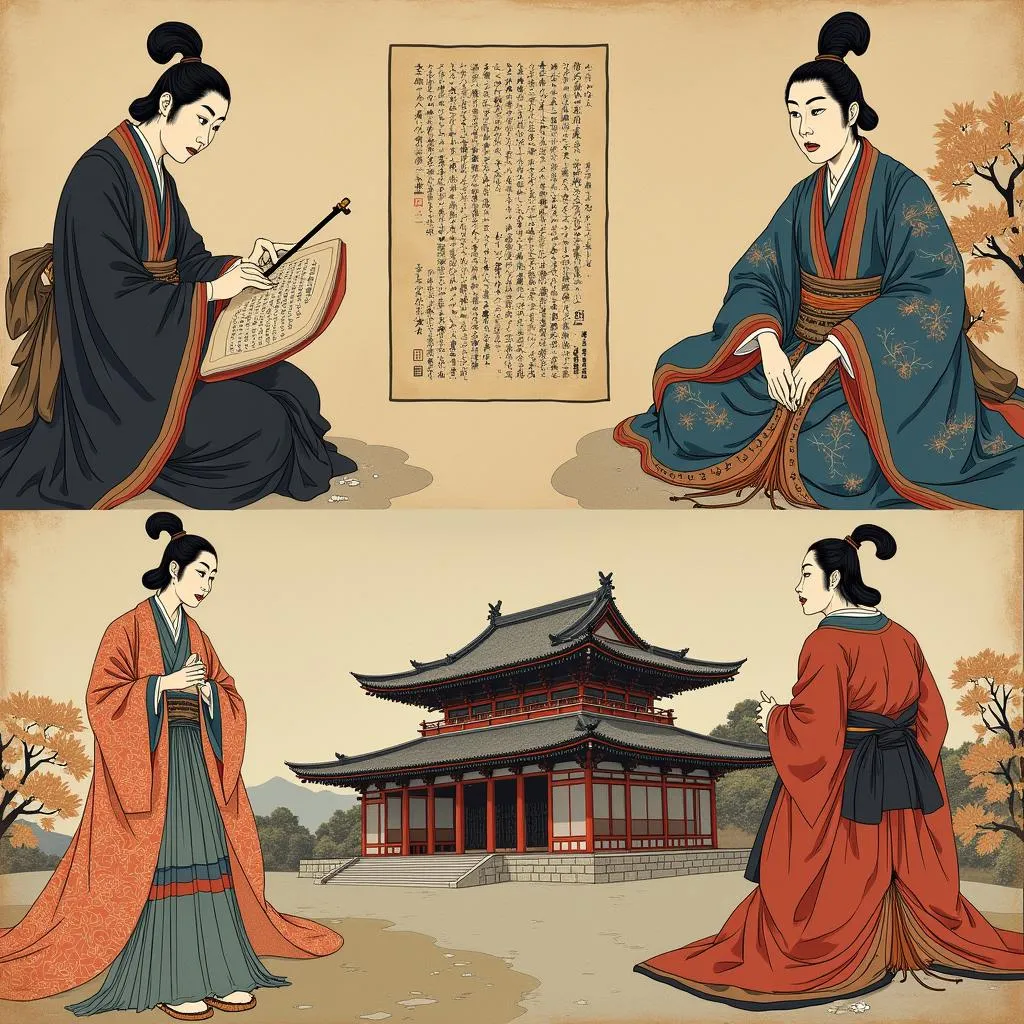The IELTS Speaking test often includes questions about history and past events. One common topic is describing a historical period you’d like to know more about. This question allows candidates to showcase their knowledge, imagination, and language skills. Let’s explore how to approach this topic effectively and score high on your IELTS Speaking test.
Nội dung bài viết
Part 1: Introduction and Interview
In Part 1, the examiner may ask general questions about history and your interest in it. Here are some possible questions:
- Do you enjoy learning about history?
- What historical period interests you the most?
- How do you usually learn about historical events?
Let’s look at a sample answer for the second question:
Examiner: What historical period interests you the most?
Candidate: I’m particularly fascinated by the Renaissance period in Europe. The explosion of art, science, and culture during this time is truly captivating. I find it remarkable how great thinkers and artists like Leonardo da Vinci and Michelangelo flourished, revolutionizing various fields and leaving an indelible mark on human civilization. The Renaissance’s emphasis on humanism and the revival of classical learning also intrigues me, as it laid the foundation for many modern ideas and values.
 IELTS candidate answering question about Renaissance period
IELTS candidate answering question about Renaissance period
Part 2: Long Turn
For Part 2, you might receive a cue card like this:
Describe a historical period you would like to know more about.
You should say:
- What period it is
- How you first learned about it
- Why you’re interested in it
- And explain why you want to know more about this period
Here are sample answers for different band scores:
Band 6-7 Answer:
The historical period I’d like to know more about is Ancient Egypt. I first learned about it in school when we studied world history. The teacher showed us pictures of pyramids and mummies, which really caught my attention. I’m interested in this period because of the amazing architecture and the mysteries surrounding their beliefs and customs. The pyramids are so huge and complex, and I wonder how they built them without modern technology. I want to know more about this period because I think understanding Ancient Egyptian culture could help us learn about human civilization’s development. Also, I find their religious practices and beliefs in the afterlife fascinating, and I’d like to explore that further.
Band 8-9 Answer:
The historical era that captivates my imagination is the Heian period in Japanese history, which spanned from 794 to 1185 AD. I was initially introduced to this fascinating epoch through a documentary series on Asian civilizations, and it immediately piqued my interest.
What draws me to this period is its remarkable cultural refinement and artistic achievements. The Heian era saw the development of a uniquely Japanese culture, distinct from the Chinese influences that had dominated previously. This period witnessed the flourishing of Japanese literature, with works like “The Tale of Genji” by Murasaki Shikibu, often considered the world’s first novel. The aristocratic court culture of the time, with its elaborate etiquette and aesthetic sensibilities, is particularly intriguing.
I’m eager to delve deeper into this period for several reasons. Firstly, I believe understanding the Heian era is crucial to comprehending the foundations of Japanese cultural identity. The art, literature, and social norms developed during this time continue to influence modern Japanese society. Secondly, I’m fascinated by the role of women in Heian culture, as they enjoyed relatively high status and were prominent in literary and artistic pursuits. Lastly, I’m curious about the political and economic structures of the time, particularly how the aristocratic rule functioned and eventually gave way to the rise of the samurai class. Exploring these aspects would provide valuable insights into the complex interplay between culture, politics, and social change in historical contexts.
 Cultural achievements of Heian period in Japan
Cultural achievements of Heian period in Japan
Follow-up questions:
Examiner: How do you think studying historical periods can benefit us today?
Band 6-7 Answer:
Studying historical periods can be really helpful for us today. It lets us learn from past mistakes and successes. We can see how people solved problems in the past and maybe use those ideas now. Also, it helps us understand why things are the way they are in the present. Learning about history can make us more understanding of different cultures too.
Band 8-9 Answer:
Studying historical periods offers numerous benefits for contemporary society. Primarily, it provides valuable context for our current social, political, and economic systems. By understanding the evolution of these structures, we can make more informed decisions about their future development. Additionally, historical analysis hones critical thinking skills, encouraging us to question assumptions and evaluate evidence – abilities crucial in our information-rich age.
Furthermore, exploring past eras fosters cultural empathy and global awareness. It helps us appreciate the diversity of human experience and the complex factors that shape civilizations. This understanding is invaluable in our increasingly interconnected world. Lastly, historical knowledge can serve as a wellspring of inspiration, offering innovative solutions to modern challenges by drawing on the wisdom and creativity of our ancestors.
Part 3: Two-way Discussion
Examiner: How has the way we study history changed in recent years?
Band 6-7 Answer:
In recent years, the way we study history has changed a lot. Now, we use more technology, like the internet and virtual reality. This makes learning history more interactive and interesting. We can see 3D models of ancient buildings or watch videos about historical events. Also, there’s more focus on different perspectives in history now, not just the view of the winners or powerful people. We’re learning more about ordinary people’s lives in the past too.
Band 8-9 Answer:
The study of history has undergone a significant transformation in recent years, driven by technological advancements and shifting academic paradigms. Digital humanities have revolutionized historical research, allowing for the analysis of vast datasets and the creation of interactive visualizations. This has enabled historians to uncover patterns and connections previously hidden in the historical record.
Moreover, there’s been a notable shift towards interdisciplinary approaches. Historians now frequently collaborate with experts from fields such as genetics, climatology, and data science to gain more comprehensive insights into historical events and processes. This cross-pollination of ideas has led to groundbreaking discoveries, such as using DNA analysis to trace ancient migration patterns.
Another crucial development is the increased emphasis on subaltern histories and marginalized voices. There’s a growing recognition of the importance of studying history ‘from below,’ focusing on the experiences of ordinary people and underrepresented groups. This approach provides a more nuanced and inclusive understanding of the past.
Lastly, public engagement with history has been transformed by digital platforms and social media. These tools have democratized access to historical knowledge and fostered global conversations about the past, albeit with the challenge of ensuring the accuracy and credibility of information shared.
 Modern methods of historical research
Modern methods of historical research
Key Vocabulary and Phrases for High Scores
-
Epoch /ˈiːpɒk/ (noun): A period of time in history or a person’s life, typically one marked by notable events or characteristics.
Example: “The Renaissance was a significant epoch in European history.” -
Paradigm shift /ˈpærədaɪm ʃɪft/ (noun): A fundamental change in approach or underlying assumptions.
Example: “The Enlightenment represented a paradigm shift in how people viewed reason and authority.” -
Historiography /hɪˌstɔːriˈɒɡrəfi/ (noun): The study of historical writing; methods of historical research and presentation.
Example: “Modern historiography emphasizes the importance of analyzing primary sources.” -
Anachronism /əˈnækrənɪzəm/ (noun): Something or someone that is not in its correct historical or chronological time.
Example: “The film was criticized for its anachronisms, such as showing modern technology in a medieval setting.” -
Zeitgeist /ˈzaɪtɡaɪst/ (noun): The defining spirit or mood of a particular period of history as shown by the ideas and beliefs of the time.
Example: “The Roaring Twenties zeitgeist was characterized by economic prosperity and cultural dynamism.”
Examiner’s Advice
To score high on the IELTS Speaking test when discussing historical periods:
- Demonstrate a good range of vocabulary related to history and time periods.
- Use complex sentence structures and idiomatic expressions where appropriate.
- Show critical thinking by analyzing the significance of historical events and their impact on the present.
- Provide specific examples and details to support your points.
- Practice speaking about various historical periods to improve fluency and confidence.
Remember, the key to success is not just knowing about history, but being able to articulate your thoughts clearly and engagingly. Regular practice and expanding your historical knowledge will help you excel in this topic.
Describe a famous historical building in your country to further enhance your ability to discuss historical topics in your IELTS Speaking test. Additionally, you might find it helpful to describe an interesting conversation you had with an old person, as this can provide valuable insights into personal histories and past eras.
By mastering these skills and expanding your knowledge, you’ll be well-prepared to tackle any question about historical periods in your IELTS Speaking test. Remember to approach the topic with enthusiasm and curiosity, as your genuine interest will shine through in your responses.


